Dan Thompson's Blog, page 16
October 10, 2012
Five Reasons to do NaNoWriMo
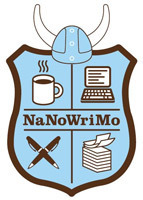 Jo Eberhardt, a blogger from down under, wrote a piece last week, giving Five Reasons Not to Do NaNoWriMo. You might think I’m disagreeing with her, but in truth, I completely agree with her. You see, she wasn’t saying not to do it at all. Rather, she was saying not to do it if you’re motivated by one of those five reasons. If you’re tempted by the looming November mass insanity, be sure to give her column a read to check for bad motives.
Jo Eberhardt, a blogger from down under, wrote a piece last week, giving Five Reasons Not to Do NaNoWriMo. You might think I’m disagreeing with her, but in truth, I completely agree with her. You see, she wasn’t saying not to do it at all. Rather, she was saying not to do it if you’re motivated by one of those five reasons. If you’re tempted by the looming November mass insanity, be sure to give her column a read to check for bad motives.
But if she gave us disastrous reasons, what are some good reasons to actually try NaNoWriMo?
1. Because it’s there.
I don’t think I’m ever going to climb Mt. Everest, but there’s something to be said for trying hard things. Succeed, fail, or surrender, you’ll learn something about yourself. In this case, you’ll learn something about your writing. Do you write more easily in the morning? Is description easier than dialog? Do you prefer to outline or make it up as you go? Do you even like the actual writing part of all this?
If you’ve never tried it, and especially if you’ve never completed a novel, it’s worth making the attempt just for what you will learn about yourself.
2. Because you can make the time for a month.
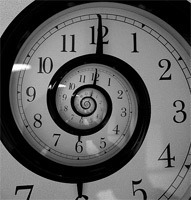 This is one of the best reasons for trying it. If you have trouble making the time to write, NaNoWriMo gives you a big tool for making that time. No, it doesn’t give you the secret recipe for time (for the curious…2 parts eternity, 1 part deadline, mix well, bake in crucible until hell freezes over). Instead, it gives you a temporary excuse to do what you always knew you’d have to do.
This is one of the best reasons for trying it. If you have trouble making the time to write, NaNoWriMo gives you a big tool for making that time. No, it doesn’t give you the secret recipe for time (for the curious…2 parts eternity, 1 part deadline, mix well, bake in crucible until hell freezes over). Instead, it gives you a temporary excuse to do what you always knew you’d have to do.
What you don’t want to admit is that making time for writing means giving up time for something else. Maybe you play a lot of video games. Then there are those seventeen TV shows you just can’t miss. Facebook might bring you joy, but it’s two hours a day. Let’s not even talk about the audiotapes from the Klingon Language Institute. And if you think you’ll simply sleep less… well, be thankful if you even get to Thanksgiving.
But you can give up the video games for a month, and if you put all your friends on some kind of no-spoiler-notice, those TV shows can sit on the DVR until December. And so on. You will survive without those things for thirty days. Cut them out, and you’ll have plenty of time for writing in November. I’m not saying it will be easy, but you can just keep telling yourself that it’s only for thirty days.
3. Because your friends and family will let you for a month.
Even after all the private things that take up your pre-November time, there are also the things you do with others. There’s that dance troupe, Aunt Milly who needs to go to the doctor, your roommate who hates to do dishes, and even that boss who expects you to come in for unpaid overtime on Saturdays. A lot of people have expectations on your time. It’s one thing for you to decide to give up TV for a month. That’s just you. But decide to bail on your friends and family? You suck, Mr. Writer.
Well, you’ll be there for them again in December. It’s just the one month, right? Someone else can drive Aunt Milly to the doctor for a while. Bobbi can take the lead in the Nutcracker this year. And for God’s sake, someone else can go into the office to reboot the server for once!
They’ll scowl at you. They’ll feel hurt that you cut them instead of someone else. They might even secretly hope for your utter failure. But it’s not like you’re personally pumping the blood through their body. They can do without you for thirty days, and at some level, they know it.
4. Because you might actually finish the damned thing.
 Even if you “win” NaNoWriMo, you won’t really have a ready-to-publish novel. Novels range from 60,000 to 120,000 words, and they’ve been edited, revised, polished, and proofread. What poops out of the back end of NaNoWriMo is not a complete novel, so don’t think that that’s what you’ll have.
Even if you “win” NaNoWriMo, you won’t really have a ready-to-publish novel. Novels range from 60,000 to 120,000 words, and they’ve been edited, revised, polished, and proofread. What poops out of the back end of NaNoWriMo is not a complete novel, so don’t think that that’s what you’ll have.
Instead, you’ll have the first 50,000 words of the unedited first draft of a novel. It’s no more publishable than when you had zero words, BUT – and this is big – it is still 50,000 words closer to that goal than you were on October 31. For some people, the hardest thing to write in a novel is the very first word.
So maybe you’ll need to take a break at the start of December. Maybe you have some DVR to catch up on. Maybe Aunt Milly is getting tired of taking the bus. Maybe you’ve put on ten pounds sitting at the keyboard and need to hit the gym.
But you managed to make the time for writing once. Sure, it was just for the one month. Your friends and family may have been counting down the days to December, but they did give you the time. Also, you hopefully learned something about yourself and your writing.
And maybe, just maybe, you want to keep going. Maybe there are few things that can slide for more than just thirty days. Maybe your friends and family will be excited by your success and understand if you’re a little less available than you were back in October.
Maybe you can actually finish that first draft. Writing that first word is pretty hard, but perhaps the second hardest word to write is the last one. NaNoWriMo takes care of only one of them, but it might give you the momentum to reach the other.
5. Because bragging feels GOOOOOD.
Have you ever sat around with some friends and talked about the novels you want to write someday but simply haven’t haven’t found the time? Remember how depressing those conversations can be? All of you sitting around, slitting your wrists, and letting all the hope bleed out…
Well, to hell with that.
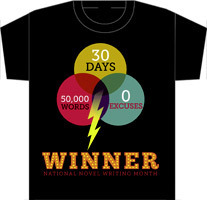 The next time someone says to you, “I’ve got a novel I want to write someday,” you don’t have to sit there and listen to them whine about not finding the time or the inspiration or the right opening sentence.
The next time someone says to you, “I’ve got a novel I want to write someday,” you don’t have to sit there and listen to them whine about not finding the time or the inspiration or the right opening sentence.
Instead, you can simply say, “Well, I look forward to reading it when you get it done. In the meantime, here’s a copy of mine.”
Oh yeah, I went there, and the T-shirt looks fabulous!
—————————————
Again, do read Jo’s column. Your success or failure in NaNoWriMo will depend a lot on your reasons for trying it. Do it for the wrong reasons, and even if you get to the 50,000 word mark, you’ll fail. But if you do it for the right reasons, you could succeed with only 34,562.
Are any of you thinking of trying it this year? What do you hope to get out of it?
October 8, 2012
The Jablowski Limit
Not all science/engineering is warp drives and robotics. Some of it’s not even as sexy as electronics. I’m talking about some of the low-level, apparently boring stuff like metallurgy, acoustics, heat flow, and fluid dynamics. These are all those invisible things that seem to magically flow forth from the lab in the back into the products in the front. There’s no glamor, no product launch, no telling the kids how it has impacted their lives. But some of it shows up in odd places.
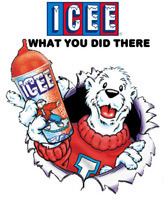 Today I’m going to talk a little about ICEEs. Here in the states, an ICEE is a cold treat that’s basically flavored slush. It comes under many different brands, from Slurpee to Slushee to God-only-knowsee. It comes in a variety of flavors like cherry or raspberry as well as a few branded soda flavors including my favorite Coca-Cola. They’re great on a summer’s day, and I’ve probably suffered some kind of permanent damage from the cumulative effect of all the brain-freeze moments I’ve had from sucking these down too fast.
Today I’m going to talk a little about ICEEs. Here in the states, an ICEE is a cold treat that’s basically flavored slush. It comes under many different brands, from Slurpee to Slushee to God-only-knowsee. It comes in a variety of flavors like cherry or raspberry as well as a few branded soda flavors including my favorite Coca-Cola. They’re great on a summer’s day, and I’ve probably suffered some kind of permanent damage from the cumulative effect of all the brain-freeze moments I’ve had from sucking these down too fast.
But they are also the source of the saddest sound in the world: that moment when it will no longer rise up the straw. We’ve all heard it, that gurgling gasping sound, the very death rattle of joy. You can stir it. You can shake it. You can move the straw. But all this buys you is another two or three slurps before you hit again. You’re like that desperate doctor trying to shock the dying patient’s heart back to life, all to no avail.
What causes this? I don’t mean the particular acoustics of the sound. I mean, why can’t I keep sucking on that straw until the very last ounce of ICEE is in my mouth, freezing my brain? It’s not like it’s always the last twenty percent that remains inaccessible. Sometimes I get down to the final few sucks before losing this joy, while other times my happiness dies at birth with the cup over half full.
 I figure it’s a combination of factors: the overall temperature of the mix, the ratio of ice to fluid, the viscosity of the fluid portion, the width of the straw, the atmospheric pressure, the height of the remaining stack vs. the length of the straw, and so on and so on. These factors together define a region in some multi-dimensional vector-space. Inside the region we are filled with that childhood joy, while outside we are left to the barren wasteland, cast out of our ICEE paradise.
I figure it’s a combination of factors: the overall temperature of the mix, the ratio of ice to fluid, the viscosity of the fluid portion, the width of the straw, the atmospheric pressure, the height of the remaining stack vs. the length of the straw, and so on and so on. These factors together define a region in some multi-dimensional vector-space. Inside the region we are filled with that childhood joy, while outside we are left to the barren wasteland, cast out of our ICEE paradise.
But how is that boundary condition defined? This is where I return to that unglamorous science. Somewhere out there, I’ll bet some fluid dynamics scientist has done the research to answer this. I think of him as Dr. Jablowski. I doubt his PhD dissertation was titled “On the End of ICEE Joy”, but he did the same kind of research on the fluid dynamics of phase-transition liquids in suction pumps. He probably had in mind some kind of industrial coolant application, but there’s always the possibility that he was inspired by some disappointment in the cafeteria’s drink line.
The shame of it is, as back lab as such research would have been and with as much information out there as there is, I will probably never find that dissertation. What’s worse is that even my relatively high level of mathematic and scientific literacy will not be up to the challenge of the multi-variable differential equations necessary to understand his conclusions. I will probably never shakes hands with Dr. Jablowski, or whatever his/her name is.
But I still appreciate that he has done the work. It probably influenced the design of the ICEE machine. His work probably keeps that slurry stirred at just the right temperature for optimum conditions. He may have advised them on the proper shape for the dispensing nozzle to maintain the surface tension around the flowing column.
So now, when I hear that saddest sound in the world, I acknowledge the work of this unheralded researcher. My friends and I now call this transition from joyful slurree to anguished gasps the Jablowski Limit.
I just hope he doesn’t mind that we made him Polish.
October 3, 2012
I Can’t Do That
I’ve been stuck on Debts of My Fathers for a couple of months now. It’s not the traditional “writer’s block” where I’m blocked on the writing itself. I’ve written plenty of other stuff. It’s also not that I’m unclear on what comes next. Certainly, I’ve jiggered the order of a few of the as-yet-unwritten events, but I’ve always known what was going to happen. So, to be clear, I know exactly what has to happen next.
I just don’t want to do it.
 Very soon, I have to do something horrific to a character I like. I have to do my dead-level best to break her down to the core, and to do that, I must do something truly abhorrent – something I would never do, something I am realizing I cannot do.
Very soon, I have to do something horrific to a character I like. I have to do my dead-level best to break her down to the core, and to do that, I must do something truly abhorrent – something I would never do, something I am realizing I cannot do.
But of course, it’s not me that’s doing it. And for that matter, the character I’m inflicting it on isn’t really suffering for it either. It’s all make-believe with one fictional character being mean to another equally fictional character. I’m just jotting this little lie down on paper.
 Unfortunately, that doesn’t help much. In some ways, to make the reader care about these characters, the writer has to care just as much. So it sucks when something bad happens to one of them. It sucks even more because, at some level, I’m the one doing it. Remember that thing about fictional characters taking up slots in our monkey-sphere? Yeah… well right now Skippy the Wonder-Monkey is looking at me with accusing eyes. “You’re doing what? To my sister Charlene the Cheery-Chimp?”
Unfortunately, that doesn’t help much. In some ways, to make the reader care about these characters, the writer has to care just as much. So it sucks when something bad happens to one of them. It sucks even more because, at some level, I’m the one doing it. Remember that thing about fictional characters taking up slots in our monkey-sphere? Yeah… well right now Skippy the Wonder-Monkey is looking at me with accusing eyes. “You’re doing what? To my sister Charlene the Cheery-Chimp?”
So now I’ve got to go do that terrible thing to someone I like, and I don’t want to do it. The scars on that character will be permanent, and if she was real, she would never actually forgive me, not even after removing my internal organs with a rusty spork. But she’s not real, so I’m going to fire up the torture machine and drop her in. I might even have to decapitate her teddy bear first.
But if I ever find out I’m in some kind of Stranger Than Fiction world, I’m really going to lose it.
October 1, 2012
This Old Thing?
The western world is ingrained with the idea of “out with old and in with the new”. It’s new and shiny vs. old and tarnished. Certainly, I do like some of the new and shiny things, but I also value some of the old and tarnished. So I recently got to thinking about the oldest object I still use on a regular basis: my key ring.
Now, what exactly do I mean by the “oldest object” and “use regularly”? Well, that’s a little fuzzy. I have a coffee table that may very well predate my existence, but it did not come into my possession until my twenties, so I don’t feel as strong of a connection to it. I also have a few artifacts tucked away from my early childhood (notably bookcases which are now in the kids’ rooms), but I don’t interact with them very regularly. So it seems that I’m mostly thinking about what object has been in my possession the longest that I still use at least weekly, and that definitely comes right back to my key ring.
 As you can see, it’s not a particularly fancy thing, just a metal ring looped around twice so that keys can be slid on and off through the gap. In most ways, it’s completely unremarkable, except for the fact that I have been using it for at least thirty-five years.
As you can see, it’s not a particularly fancy thing, just a metal ring looped around twice so that keys can be slid on and off through the gap. In most ways, it’s completely unremarkable, except for the fact that I have been using it for at least thirty-five years.
When I first got it, it was actually a bit fancier. There were two identical rings held together by about three inches of black leather. I got it when I was a kid, no more than ten, possibly as young as seven or eight, and I paid probably no more than fifty cents. I put my house key on one ring, and hung it by the other ring on a push-pin stuck into my bedroom wall. I know I had it by age ten, because that was the year Mom went back to work part-time and would not be home until thirty minutes after school let out, so this was my way of letting myself into the house.
Eventually the leather strap broke, and the other ring was discarded, but by the time I turned sixteen, I added another key to the surviving ring: the key to my old 1972 Chevy Impala. The years passed, and it saw several dorm keys come and go, including one to my now wife’s room. (Rowr!) Then came the key to my first apartment and then that first rented house. I was married and working by then, so I added the keys to my wife’s car as well as one for the front door of the office.
That’s when the first key came off: my old house key. Sure, some keys had already come and gone. After all, I had to turn in the dorm keys or face a $50 charge for changing the locks. The apartment key had come and gone as well, and I don’t know how many bike-lock keys had passed through like smelly transients. But my house key had stayed the whole time. That one was permanent. Right?
But I didn’t live there anymore, and that point was made clear the first year of my marriage when Christmas rolled around. My mother called to ask when we were driving up to visit. I told her I wasn’t. After all those college years of being apart during the holidays, my wife and I were determined not to travel for Christmas. “But don’t you want to come home for Christmas?” my mother asked, and I finally said the words that slashed the apron strings with all the grace of a machete: “Mom, I am home.”
I took the house key off that very day.
Other keys have come off more easily. We sold my wife’s car, and I handed over the key, taken right off the ring then and there. The rent house key left without leaving an impression, and when we sold that first starter house to another couple, I again pulled the key off and handed it over at the closing. Surprisingly, when I sold my software company and headed off to greener pastures, there was no hesitation at letting that key go. I suppose that meant I was really done.
I used to keep an empty 44-magnum bullet on it as a separator, making it easy to grab hold of the right car key in the dark. That had to go after the 9-11 terrorist attacks in 2001. I thought about simply removing it for flights as some short-term fix, but I knew that was a recipe for misplacing it. Plus, I suppose I realized that the security restrictions were not going to be temporary. I suppose it’s still rattling around in my nightstand, but I haven’t seen it for years.
But other keys have hung on… notably that brass one with the notch. That was the key to my first car. I sold it back in 1997 or 1998, but I’ve never been able to bring myself to remove the key. At first I told myself that I was using it as an easy-access pocket knife for ripping open letters and packages, but now its teeth are so dull that I’m not sure it would tear even Kleenex. Even if that old Impala is still out there and running, I doubt this worn key would still turn the ignition. Yet it remains.
But through it all has been that one little key ring, bought ages ago with coins saved from my allowance as a sign of my impending maturity. Of all the things in my life, all the little icons and rites of passage, it’s funny to see what survives.
So how about you? What’s the oldest thing you’re still using?
September 28, 2012
Review: Highway to Hell, by Rosemary Clement-Moore
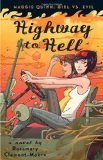

This is the third (and so far final) book in the Maggie Quinn vs. Evil series. I really enjoyed the first two (Prom Dates from Hell and Hell Week), but I have to say I was a little disappointed in this one. However, I will admit that much of my disappointment can be tied to my expectations that the book was going to be something that it was not.
The story follows Maggie Quinn and her old high-school friend D&D Lisa, aka Lisa the Evil Genius, on their way down to Padre Island in south Texas for a week of spring break debauchery. Along the way, they get sidetracked and end up spending the bulk of their week investigating a local legend and ultimately going into battle against capital-E Evil.
Some of the other supporting cast of do-gooders show up to join in, and the locals add their own skills. Probably what I liked best was seeing them all come to rely on one another’s strengths. It was reminiscent of the final battle in the summer movie Avengers when they finally stopped bickering and worked as a team. And the Evil and the supporting history for it fit together nicely.
However, I was really expecting them to actually reach Padre Island and run into some as-yet-unknown capital-E Evil down amongst the bikinis and beer kegs. You see, to me, much of the charm of the first two books was how Maggie dealt with Evil amidst some common rite of passage. The first book was battling a demon in the run-up to high school prom, while the second book dealt with curses and blood pacts all tied in with a college sorority’s initiation rituals. This one seemed to be aimed at the rite of spring break.
So I figured they would be fighting Evil during the road trip itself or on the island of crazy parties and loose morals. (Not that Maggie Quinn’s morals were ever going to be all that loose. I mean, really, she’s a good girl.) But still, I was expecting another rite of passage. Yes, the conflict occurred on a road trip, but the road trip wasn’t really part of the story. It merely bookended the tale, providing an excuse for their arrival in middle-of-nowhere and a reason for their eventual escape, so it wasn’t even a proper road trip, with bad fast food, dirty rest stops, scary truckers or any of the other elements of a long cross-country trip. Instead of a rite of passage, they were out-of-towners tangled up in some local legend.
I suppose if I could have gotten past that, I would have enjoyed this book a lot more. After all, the plot and characters really worked, but in the end, I confess I felt like Private Hudson in Aliens asking, “Is this going to be a stand-up fight, sir, or another bug hunt?” Well, as my reaction shows, it was a bug hunt.
September 26, 2012
Hook Me Early or Don’t Bother
I’ve just had a rather frustrating experience with a book sample. I was looking forward to this book. It’s SF from an award-winning author who I have previously read and enjoyed. The overall themes of the book are ones that interest me: Fermi’s paradox and first contact. It promised to be a good, intellectual story. The problem was that when I got to the end of the sample, the story had not yet begun.
The e-book samples for the Kindle are typically about 10% of the book. If it’s overloaded with front-end material, you might not get much of the narrative text, but most fiction books keep that relatively short. The paper version of this book is listed at about 800 pages, and the sample felt pretty long, though perhaps closer to 50 pages than 80. Still, it was a fair amount of text.
And yet, all of those pages were spent on introducing various characters going about their lives and showing off all the cool technology the author had imagined for this world. By the end of the sample, I had met seven or eight characters and also had some background text on the Fermi paradox, some poetry, and some of the recent history of this particular future Earth.
 But I didn’t feel like the story had actually started. Instead, I had half a dozen story lines that did not seem to connect at all except that the character in scene fourteen was apparently the mother of the guy in scene nine. In fact, the only character I saw twice was really just one scene broken into two pieces a mere fifteen minutes apart.
But I didn’t feel like the story had actually started. Instead, I had half a dozen story lines that did not seem to connect at all except that the character in scene fourteen was apparently the mother of the guy in scene nine. In fact, the only character I saw twice was really just one scene broken into two pieces a mere fifteen minutes apart.
In short, the author spent all those pages, and he never hooked me. I had not had enough time with any single character to develop a connection. In fact, the only character that had summoned any emotion from me was a spoiled brat who looked like he was about to die. My emotional reaction? “Good riddance!”
So when I reached the decision point for my purchase, I had not developed any connection with any character, had no desire to see what happened to anyone, and I still had no idea what the book was going to be about. The only reason I know that it’s going to be about Fermi and first contact is because the author has been promoting it like a broken record.
 I think this has always been true, but it’s true now more than ever: You need to hook the reader early. How?
I think this has always been true, but it’s true now more than ever: You need to hook the reader early. How?
Give me a few characters to care about. There can be others, but focus on just a few.
Show how these characters are going to interact with each other. If they’re not obviously connected, give me some hints on how they will eventually connect.
Make it clear what the inciting incident is and that it’s happening right now. Yank these characters out of their ordinary world in the first few pages.
Show me a source of conflict early on. It doesn’t have to be THE conflict for the whole book, but at least put something or someone in jeopardy to keep me turning pages.
That’s about it. If you can hit those four things, I’ll keep going past the sample without even looking at the price tag. Miss all of them, and I’m going to go write about it on my blog instead.
And it’s a shame, too, because I was really looking forward to see what this author had to say on the Fermi Paradox. Maybe I should see if he wrote an essay on it.
September 24, 2012
There’s a Brain-App for That
I was at FenCon over the weekend, and in a panel on embedded (or implanted) computers, the question was raised: what application would you want that doesn’t exist now? That is, if you had some kind of computer implanted in your brain, what would you want it to do for you that you can’t do right now without it?
Here are a few possible answers, some my own and some from other people in the room:
Who Are You? I’d want something to do facial recognition on the person in front of me and remind me who they are, how I know them, and what subjects to avoid when talking to them. It’s not just a matter of remembering the name, because even if I can remember that his name is Bob, it would be nice to know that we met at Jim’s bachelor party – you know, the one with the orangutan stripper – and that it would be best to duck and hide in shame. Or if I can’t hide, I should at least know better than to bring up sailing ships lest I be cornered into a two-hour dissertation on the superiority of the jib sail over the genoa sail.
Dream-vo: This is the DVR for your dreams. No longer do you need to scramble for pen and paper to jot down details of that crazy dream. You don’t even need to wake up. Just replay it the next morning and fast forward to the part with the flying dolphins.
IMDB Brain Search: The Internet Movie Database is a very useful site, but even if you have it on your smart phone, it doesn’t really help when you’re talking about that movie, with the guy… you know, the one with the blonde hair, and they had that sparkly thing with the handle? Yeah, that’s the one. It would also be nice in that you could immediately know where you’ve seen that actor before. Of course, playing “Six Degrees of Kevin Bacon” will never be the same again.
Where Are My Damned Keys? A brain implant won’t keep you from leaving your keys behind the toaster, but with enough input monitoring 24/7, it should at least be able to tell you where they are. And your favorite pen, your glasses, your left sneaker, the good scissors, and the remote control. Of course, if the kids took them, this suddenly becomes a network application.
Too Boring; Didn’t Listen: I think we’ve all run into that wall of text that was simply too long to read. Hence the phrase tl;dr (too long; didn’t read). Whenever I’ve run into that, I’ve wanted a little tool to read it, present me with a summary, and give some kind of guesstimate of whether or not it was worth the number of electrons that died for it. (Yes, I know electrons don’t die – they only wish they could.) But if I had a computer implant, I’d want one of those for audio. Remember that guy who went on for two hours about jibs vs. genoas? Too boring; didn’t listen. How about the app that filters it all and says, “Jibs handle better when tacking.”
So, how about you? What’s your favorite iBrain app?
September 22, 2012
Blogiversary
This blog is now officially one year old. My first post was little more than “Hey! This is my blog!” and a brief introduction. I didn’t have any grand plans then. I can’t say my plans are that grand now either, but at least I’ve got some momentum.
And momentum is exactly what I was lacking a year ago. I had been piddling around with my writing for years… well, decades really. I felt I had a lot of stories to tell, and I thought my writing was rising to a professional level, but I was not getting anywhere. Of course, I wasn’t trying that hard, either. I had a couple of leads on agents, but I wasn’t sure how I wanted to proceed. For that matter, I wasn’t sure I even wanted to proceed.
You see, somewhere in that tentative agent hunt, one of those agents had asked an important question: why do I want to be published? This was different than the age-old question of why do I want to write, and notably, it was a question I had never asked myself. At the time it was asked, my only answer was that it seemed to be the next logical step, but writing and publishing are very different tasks, and just because I enjoyed one was no reason to think I would enjoy the other.
The other lurking question was whether to pursue traditional publishing at all or head out into the lands of self-publishing on my own. “No unagented submissions” was the rule of the day, and even getting an agent was a dicey proposition. Meanwhile, a legion of scam artists were eager to pounce on my dreams and turn them into debts and disaster. And the self-publishing evangelists were making claims that seemed too good to be true.
To say I was stuck would be an exaggeration of my forward motion, but that had changed two weeks earlier. I was having lunch with a friend, and we were both bemoaning our lack of progress. He was trying to make the jump “above the line” in films, and I was trying to move forward on some kind of writing career. We had both been stuck for years, and we didn’t see anything obvious that was about to yank us forward.
And that’s when I said it. “I don’t want to be having this same conversation in two years.”
It’s not pithy enough to be a Nike slogan, but it had the same effect. I dusted off this domain – registered but idle for years – and started blogging. I finished the edits to Beneath the Sky. I finished the draft to Hell Bent. I wrote the draft to Ships of My Fathers. When the new year came around, I finally answered my questions about publishing and made the decision to self-publish Beneath the Sky. In May I did exactly that. Since then I’ve done first pass edits to Ships of My Fathers and launched into the draft of its sequel, Debts of My Fathers.
I’d like to say it’s been one steady roll of successes, but I’ve had my stumbles along the way. Publishing Beneath the Sky took longer than I had hoped, and I feel like I rushed the cover. The draft to Debts of My Fathers stalled over the summer due to distractions from a house full of special-needs kids and some problems with how the third act was shaping up. I’ve resolved those now, and I’m heading back in to finish it up. But now I’m two months behind where I wanted to be.
Still, I’m eager to keep moving and confident that when next September rolls around, I won’t be having that same stuck-in-the-mud conversation. Tasks that I’m still hoping to finish off this year include: finishing Debts of my Fathers, polishing and publishing Ships of my Fathers, getting Hell Bent into the hands of my beta readers, and writing the first draft to the sequel to Hell Bent, tentatively titled Stone Killer.
As for the blog, I have a few changes in mind. Some of them are cosmetic, but a few are content-focused. I will probably be dropping my intermittent blog entries on making gold in World of Warcraft – though for the record, I did punch through the one million gold mark this summer. (Fanfare? Cheers? Golf clap??) Instead of talking about gaming, I’m going to take a stab at writing more short fiction. This is something I have not done regularly since the 1990’s, but I want to give it another shot. The SF/F essays will continue, and I will likely continue to talk some about writing and publishing. The book reviews will keep coming along as fast (er, I mean, as slow…) as I read them, but I’m thinking about adding some columns on movies as well. Podcasting is still a possibility, but it’s iffy.
I hope to have two or three more books in print by the time this blogiversary rolls around next year, but other than that, I have no idea where this is all headed. As always, I’m making it up as I go.
September 21, 2012
Review: The Ghost Brigades, by John Scalzi


This is the sequel to Old Man’s War and takes place amongst the Colonial Union’s super soldiers, except this time, instead of following the tale of some regular super soldier, we tag along with even more elite special forces, specifically Jared Dirac.
By and large, I enjoyed the book, but there were a few things I didn’t like. Specifically, I felt that the backstory on how Dirac came to be was a little convoluted and required more than one person to be… well, maybe a little dumb. Having said that, though, I liked Dirac. He was a good guy with a very dry sense of humor.
The other thing I didn’t like was the level of non-action exposition the tale required. That’s common in sequels since they need to fill in the backstory of the universe without going to the trouble of discovering it all over again. It’s easy either to skimp on it or to unload the dumptruck. This one fell a little too far on the dumptruck side for my tastes.
The tale took us through some fun combat, some terrible losses, and some interesting existential conundrums. At times, it seemed a bit too philosophical, but the ultimate payoff was worth it, both in terms of plot and character. I won’t say that everyone got what they deserved, but I will say that I was satisfied with what everyone got.
Sorry to be that vague, but this is one of those that isn’t served well by summing it up. I’ll just say that it’s an interesting piece on how your choices and your experiences make you… you.
September 19, 2012
Writers Are Cruel, so Have Pity
If your reading has progressed past Dr. Suess, you’ve almost certainly had one of those “You Bastard!” moments. That’s when the author hits you with something both surprising and cruel. That sidekick you loved? Oops, he’s dead. That knight in shining armor? It turns out he’s the bad guy. And that character you identify with so closely? Yeah… she’s going into the meat grinder.
While it would be fun to toss it off with the glib observation that we’re a vicious breed, the truth is better. Writers are cruel for a good reason.
By putting characters through the crucible of their misfortune, the reader gets put through it as well. We get the full emotional ride, but we come out the other side with no scars. Well, maybe a few scars. I’m still kind of shaken by some of the deaths at the end of Harry Potter, but I guess that’s part of it too. Voldemort didn’t kill any of my friends and family, and yet I got to taste that sense of terrible loss, and while I prefer a joyful life, I know it is one tempered by grief. Maybe it’s better to have some idea what I’m up against in fiction before I’m facing it for real.
But it’s not enough for a writer to drop in pain and loss by recipe. To work, it’s got to be real. At least, that’s been my experience, and I’ve heard it from others as well. “Writing is easy,” they say, “just pull out the paper and open a vein.”
I think that’s why some of the best advice for young writers is to go out and live some life first. Every heartache, every mistake, every open wound… it’s all grist for the mill. I have suffered. I have seen suffering. And, I confess, I have sometimes caused suffering.
Writing about it makes for poor therapy, since you kind of have to wallow in it at times. Rather, it’s best to have already dealt with it before doing the writing. That way you can keep it close enough to make it real but far enough away to keep it from consuming you. Of course, my life has been far from Schindler’s List or The Mission, but it has had its cathartic moments. Seven years after my father’s death, I’m finally tapping into that well. I don’t know how long it will be before I can write about my sons. Maybe never.
So I think about that when some author pulls the rug out from under me with the demon ripping apart that innocent five-year-old child. I want to hate him for being so cruel, but I also realize that at some level this was real to him. No, it wasn’t actually a demon, and chances are the kid wasn’t actually eaten alive, screaming as he went, but somewhere in that author’s life, whether it was him or someone he knows, there was very likely some tragic death of a child. If he hadn’t had any real emotion to tap into, it wouldn’t have had the power to affect me so much.
So, as much as I call him a bastard, I kind of have to feel sorry for him, because whatever real events inspired that grief on the page, I imagine that living it hurt a hell of a lot more than simply reading it. So, who is more cruel, the author, or the fate that put so much grist in the mill?
And people wonder why so many great writers suffer from depression and alcoholism.



